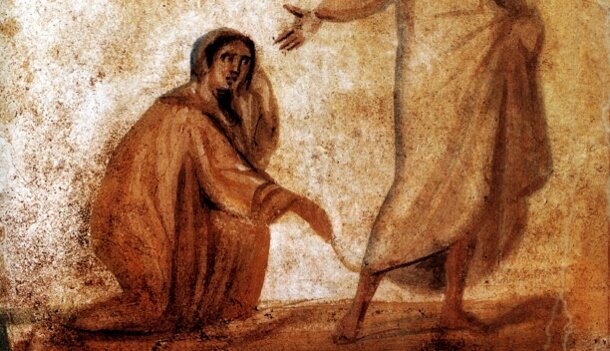Reflection for Today ▶️ ⏩ ⏹️
An Issue of Blood, ink and watercolour, by Tobias Mayer, 2022
And a certain woman, which had an issue of blood twelve years, And had suffered many things of many physicians, and had spent all that she had, and was nothing bettered, but rather grew worse, When she had heard of Jesus, came in the press behind, and touched his garment. For she said, If I may touch but his clothes, I shall be whole. And straightway the fountain of her blood was dried up; and she felt in her body that she was healed of that plague.
— Mark 5:25-29
The book of the law makes it very clear that a menstruating woman is unclean,1 and that anything she touches or comes into contact with is rendered equally unclean.2 The woman in this story is clearly not menstruating, but her ailment to all intents and purposes resembles this natural womanly state, so we can assume she has been socially ostracised, shamed and treated as dirty for twelve years, continually, and she was desperate to heal. Pushing through the crowds she touches Jesus' outer garment in the believe that any kind of contact, even through his clothing, will be enough. This could be considered superstition, and the healing written off as placebo. And yet, she was healed. It was her faith that healed her, and we can learn much from this.
When we accept society's view of us, or when we believe we are unwell, or even incurable, to a greater extent than is given credit for this belief keeps us unwell. Whatever we focus on is what we get. In Jesus the (unnamed) woman saw hope, saw a different person offering a different vision of society, one where such brutal laws of ostracisation and treating women as second class citizens (or even third class citizens, on par with cattle and tents) was no longer acceptable. Her faith that this world would come to pass is what healed her. Hope is what healed her.
It is interesting that Mark chose this particular narrative to illustrate both the essential difference of God's kingdom to earthly empires, and Jesus' own role as guide to that kingdom. Mark chose a member of a seriously oppressed group, having probably the worst affliction anyone could have at the time, on par with leprosy. The message here is clear: in God's kingdom a person is a person; we are all equal in the eyes of the Lord. To reach this kingdom all we need is faith and discipleship. The woman in touching Jesus' clothing became a disciple, not just in that moment but for the rest of her life. The twelve named disciples, as usual in Mark's story, failed to understand the significance of this, seeing the woman as all their peers did, as all the priests and rulers did, as a dirty nuisance. We are challenged by this story to not be like those disciples, but to find a way to see differently, to break with convention, to develop compassion.
And he said unto her, Daughter, thy faith hath made thee whole; go in peace, and be whole of thy plague.3
 4
4
1 See Leviticus 15:19-31, especially verse 25: And if a woman have an issue of her blood many days out of the time of her separation, or if it run beyond the time of her separation; all the days of the issue of her uncleanness shall be as the days of her separation: she shall be unclean.
2 See also the earlier reflection, Menstruation
3 Mark 5:34
4 Wall painting from the Catacombs of Marcellinus and Peter, circa 4th century AD